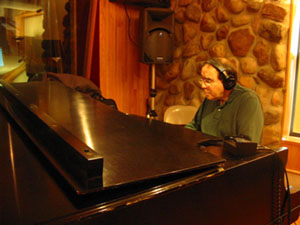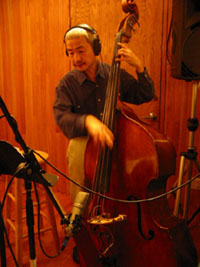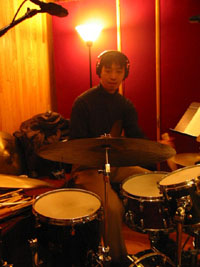
 Classic Jazz Pianist Steve Elmer's passion is music. He has nurtured that passion since he first learned to play the drums in a Brooklyn junior high school when he was thirteen years old. His most recent project is a CD of his own original compositions, I Used To Be Anonymous, recorded in February, 2006 with Hide Tanaka on bass and Shingo Okudaira on drums: The Steve Elmer Trio. This month at Unlikely, we are proud to feature two of their tracks: "Dance of the Drackots," which is available for listening here on the web site, and "Easy Mr. B," which can be listened to here or downloaded free. Be sure and check out http://www.cdbaby.com/steveelmertrio, where you can listen to samples of all nine tracks, see reviews, and purchase the album on-line. The trio begins a tour in Japan on February 15, 2007, playing in a number of cities throughout the country, and finishing on March 4.
Classic Jazz Pianist Steve Elmer's passion is music. He has nurtured that passion since he first learned to play the drums in a Brooklyn junior high school when he was thirteen years old. His most recent project is a CD of his own original compositions, I Used To Be Anonymous, recorded in February, 2006 with Hide Tanaka on bass and Shingo Okudaira on drums: The Steve Elmer Trio. This month at Unlikely, we are proud to feature two of their tracks: "Dance of the Drackots," which is available for listening here on the web site, and "Easy Mr. B," which can be listened to here or downloaded free. Be sure and check out http://www.cdbaby.com/steveelmertrio, where you can listen to samples of all nine tracks, see reviews, and purchase the album on-line. The trio begins a tour in Japan on February 15, 2007, playing in a number of cities throughout the country, and finishing on March 4.
Steve Elmer has recorded two other CDs with a quartet called "The Jazz Mentality" featuring Chris Potter on soprano/alto/tenor saxophones, Ralph Hamperian on bass, and Myles Weinstein on drums: Maxwell's Torment (VAI Audio, 1992), and Show Business Is My Life (Koch Jazz, 1997).
The music of The Steve Elmer Trio remained on Unlikely 2.0 for one year, then was removed for reasons of space and copyright.
 The story goes that a well-known jazz piano player liked the way Steve played but couldn't understand why nobody knew who he was. The pianist shared this thought with a mutual friend and said to her: "Steve Elmer is the most anonymous piano player in New York." So it started as a goof but the August issue of Jersey Jazz, the New Jersey Jazz Society Magazine, reviewed it and wrote, "The CD is well-titled. Before Elmer sent this disc for review, he was certainly anonymous to me." Now that's fine and no disrespect for New Jersey now, but Steve's been on the scene in NYC for a long time. He has played with everyone, and I mean both singer and musician. Few know that he studied, for example, with Lennie Tristano back in the day or that he first played drums making his living at it in the New York City metropolitan area until he was twenty-five years old.
The story goes that a well-known jazz piano player liked the way Steve played but couldn't understand why nobody knew who he was. The pianist shared this thought with a mutual friend and said to her: "Steve Elmer is the most anonymous piano player in New York." So it started as a goof but the August issue of Jersey Jazz, the New Jersey Jazz Society Magazine, reviewed it and wrote, "The CD is well-titled. Before Elmer sent this disc for review, he was certainly anonymous to me." Now that's fine and no disrespect for New Jersey now, but Steve's been on the scene in NYC for a long time. He has played with everyone, and I mean both singer and musician. Few know that he studied, for example, with Lennie Tristano back in the day or that he first played drums making his living at it in the New York City metropolitan area until he was twenty-five years old.
Steve's got a feel for what's happening in the music, both its history and where things are right now. He joined us on the bandstand at Bowery Poetry Club last year and it was like he had been playing with spoken word poets all his life, I mean the fit was so right: supportive, hard swinging and roots-driven. We met next at a studio date that was "rained out," and we were a bit bummed, at least I was; he is so free-spirited that as we walked along Lexington Avenue without umbrellas he ducked into every bar along the way that had a piano. Each time he shook hands with the owner, who then invited him to play a few tunes. Steve had no charts with him, but he asked the audience what they wanted to hear and out came these incredibly well played standards with custom-built moments for his improvisational gift. I mean, he showered the place with harmonic delight. He hears it all and has 88 fingers, so to speak, which is about the highest compliment one can give to a pianist in jazz. And yeah, man, he was, as Joni M put it, playing for free.
 You know, usually I gotta hear one tune over and over when I first play a record. It's only after I have that one song in my skin that I can get to the rest of the music; but not with the Elmer trio. I turn it on and it's sixty minutes of one song suite to me. Sometimes I play it all day long. Don't get me wrong: the tunes are as different and distinct as they can be. Elmer is a composer who writes gorgeous stuff and the trio really breaks out, but every song is connected by Elmer's definition of classic jazz, the only words in the CD's jewel case except for the names of the band and times of the tunes: "Play the original song, improvise on the melody, the harmony and the form. Keep it swinging one way or another." The thing with a piano trio is chops, empathy for what the other two are doing and timing. These three have been playing together for quite awhile is what I mean; once the line-up's solid, the sky is the limit. And when they are all original compositions they're playing, watch out. The first track, "Peter the Painter," reveals this with such great delight and swing. Really, they've opened the door wide and let the ancestors in, as they say. See, what Elmer has managed to do—five of the nine tunes remind and refer you to pianists Bud Powell, Bobby Timmons, Thelonious Monk, Wynton Kelly and McCoy Tyner; another one, "Easy Mr. B," remembers Billy Eckstein, the black Orpheus who had the gals fainting in the aisles (this before Sinatra), a baritone crooner who developed the first bebop band---is create an element of evocation with an eye toward those who have historically "changed our ears." However, he is signifyin' on their contributions, making it his and "making it new," rather than parading them down Memory Lane or parodying their styles or merely posturing about their genius. My god, man, "Tyner Time" is a mountain of joy! Word to your mother: you have to smile at the "Giant Steps" reference and his treatment of McCoy and how Tanaka and Okudaira swing underneath. Sure, it's a tribute, but the biggest tribute of all is adding your gift to their gift. And that's what Elmer has done on each tune. "Dance of the Drackouts" sends out in semaphore a taste of "Parisian Thoroughfare" and Powell's speed and wit, but it's got more Elmer in it than anything else. "Blues for Bobby T" is heaven bound and never quits! Now that's what a trio who knew each other well can do. "Wounded Heart" is a ballad of such depth of feeling, and it's followed by the nutty, bop-ish "Keep Your Eye on the Ball." I don't know how Elmer does it, but I feel the way that tune sounds a lot of the time. Shingo shows what the drums are for and really plays Pac Man on Steve and Hide. The trio certainly can get arrested, weird and wonderful, too; they start out free and morph into an unhurried 4/4 in "Monk's Slow Drag," taking us to Japan via Shingo's cymbals and landing us deep in the blues via Thelonious and a surprise ending. "Steppin' Out with Wynton K" is just a little more than you could imagine: there's mystery meeting mastery, but then there's that little something extra that Elmer adds that makes the tune spooky yet happily upbeat. This is his greatest quality. In a word, the cat is real jazz musician. —Kirpal Gordon
You know, usually I gotta hear one tune over and over when I first play a record. It's only after I have that one song in my skin that I can get to the rest of the music; but not with the Elmer trio. I turn it on and it's sixty minutes of one song suite to me. Sometimes I play it all day long. Don't get me wrong: the tunes are as different and distinct as they can be. Elmer is a composer who writes gorgeous stuff and the trio really breaks out, but every song is connected by Elmer's definition of classic jazz, the only words in the CD's jewel case except for the names of the band and times of the tunes: "Play the original song, improvise on the melody, the harmony and the form. Keep it swinging one way or another." The thing with a piano trio is chops, empathy for what the other two are doing and timing. These three have been playing together for quite awhile is what I mean; once the line-up's solid, the sky is the limit. And when they are all original compositions they're playing, watch out. The first track, "Peter the Painter," reveals this with such great delight and swing. Really, they've opened the door wide and let the ancestors in, as they say. See, what Elmer has managed to do—five of the nine tunes remind and refer you to pianists Bud Powell, Bobby Timmons, Thelonious Monk, Wynton Kelly and McCoy Tyner; another one, "Easy Mr. B," remembers Billy Eckstein, the black Orpheus who had the gals fainting in the aisles (this before Sinatra), a baritone crooner who developed the first bebop band---is create an element of evocation with an eye toward those who have historically "changed our ears." However, he is signifyin' on their contributions, making it his and "making it new," rather than parading them down Memory Lane or parodying their styles or merely posturing about their genius. My god, man, "Tyner Time" is a mountain of joy! Word to your mother: you have to smile at the "Giant Steps" reference and his treatment of McCoy and how Tanaka and Okudaira swing underneath. Sure, it's a tribute, but the biggest tribute of all is adding your gift to their gift. And that's what Elmer has done on each tune. "Dance of the Drackouts" sends out in semaphore a taste of "Parisian Thoroughfare" and Powell's speed and wit, but it's got more Elmer in it than anything else. "Blues for Bobby T" is heaven bound and never quits! Now that's what a trio who knew each other well can do. "Wounded Heart" is a ballad of such depth of feeling, and it's followed by the nutty, bop-ish "Keep Your Eye on the Ball." I don't know how Elmer does it, but I feel the way that tune sounds a lot of the time. Shingo shows what the drums are for and really plays Pac Man on Steve and Hide. The trio certainly can get arrested, weird and wonderful, too; they start out free and morph into an unhurried 4/4 in "Monk's Slow Drag," taking us to Japan via Shingo's cymbals and landing us deep in the blues via Thelonious and a surprise ending. "Steppin' Out with Wynton K" is just a little more than you could imagine: there's mystery meeting mastery, but then there's that little something extra that Elmer adds that makes the tune spooky yet happily upbeat. This is his greatest quality. In a word, the cat is real jazz musician. —Kirpal Gordon





















